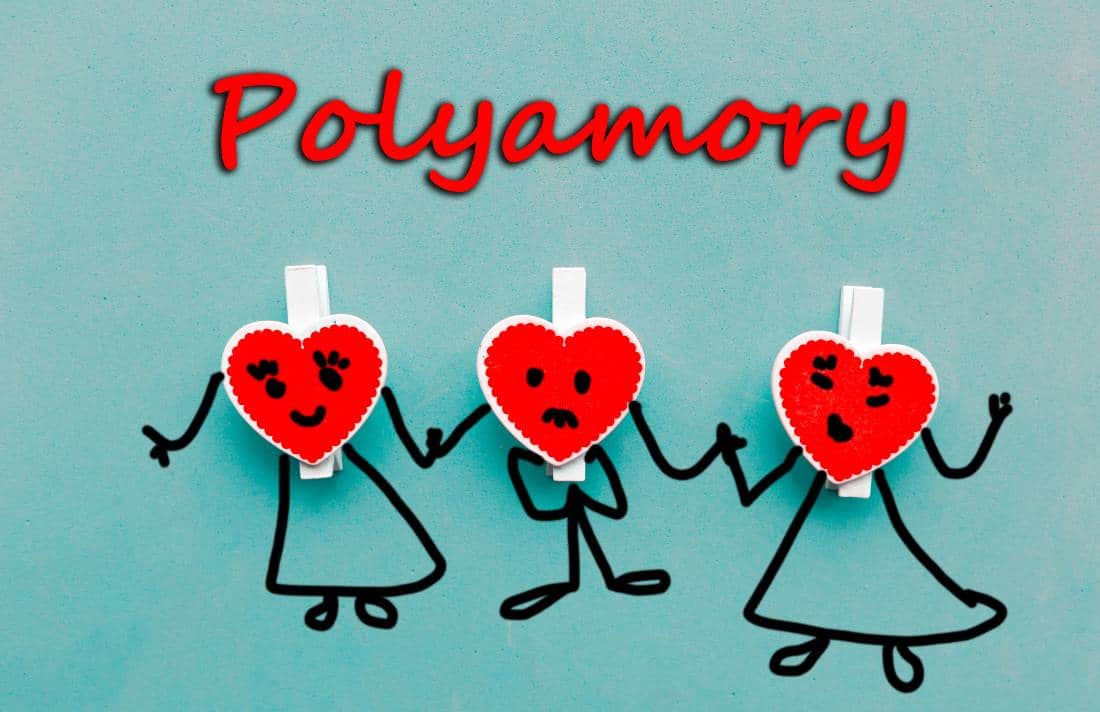Online Polyamory Couple Therapy, RCI-Licensed Psychologists
Confidential online therapy for ethical non-monogamy. Get expert help with jealousy, boundaries, communication, emotional regulation and multi-partner relationship dynamics.
- 60–90 minute online video sessions
- Secure and confidential tele-counselling
- Available worldwide
100% online sessions, secure, private, and accessible globally.

Types of Polyamory We Support Through Online Counselling
We work with individuals, couples, triads and polycules navigating various forms of ethical non-monogamy. Our RCI-licensed therapists provide practical, confidential online support tailored to each structure.
Kitchen Table Polyamory (KTP)
Partners and metamours maintain friendly, open connections, sharing social space and mutual respect.
Parallel Polyamory
Relationships run largely independently, with minimal interaction between metamours.
Hierarchical Polyamory
Some relationships are prioritised (primary/secondary), which helps shape commitments and limits.
Non-Hierarchical Polyamory
Relationships are valued without formal ranking; agreements are negotiated case-by-case.
Solo Polyamory
Individuals prioritise autonomy and independence while engaging in multiple meaningful relationships.
Triads, Quads, V-Structures & Polycule Dynamics
We support multi-partner configurations with guidance on boundaries, roles and emotional safety across the network.
Common Reasons Polyamorous Partners Seek Online Therapy
Online ENM-affirming therapy helps partners understand complex emotions, reduce jealousy, improve communication and build secure agreements across multi-partner relationships.
Jealousy and Insecurity
Therapy helps identify jealousy triggers, reduce comparison anxiety and stabilise emotional reactions in polyamorous relationships.
Communication Gaps Between Partners & Metamours
Misunderstandings are common across partners; online ENM-focused counselling builds clarity, structure and respectful dialogue.
Boundary Conflicts & Rule Misalignment
Partners often disagree on rules, expectations or emotional limits; therapy helps negotiate safe, clear agreements.
Time Management in Multi-Partner Dynamics
Love is abundant but time is limited; therapists guide partners to create fair, sustainable schedules that reduce resentment.
Emotional Safety & Trust Repair
When trust feels shaken, online sessions rebuild emotional stability with guided repair conversations and secure-attachment practices.
Stress From NRE (New Relationship Energy)
NRE can disrupt existing bonds; therapy helps balance excitement with responsibility and emotional consistency.
Fear of Losing Primary Bond or Feeling Replaced
Online ENM-trained therapists help partners process fear, validate needs and maintain secure primary attachments.
How Online Poly-Affirming Therapy Works at PsychiCare
Our RCI-licensed therapists offer structured, non-judgmental guidance for partners navigating ethical non-monogamy. Sessions focus on clarity, emotional safety and sustainable relationship agreements.
- 100% online video sessions with ENM-trained therapists
- Flexible global timings for partners in different locations
- Confidential and secure virtual relationship counselling
- Neutral, experienced guidance for polyamory and ENM partners
- Frameworks for emotional regulation and conflict reduction
- Support for building sustainable ENM boundaries and agreements

Neurodiversity
& Polyamory
Online support for autistic, ADHD, and BPD partners navigating ethical non-monogamy.
Polyamory and Autism
Autistic partners benefit from structure, clear expectations and predictable routines. Online therapy helps reduce overwhelm by teaching direct communication tools and step-by-step agreement building.
Polyamory and ADHD
ADHD can affect organisation, time allocation and emotional impulsivity. Therapy offers planning systems, grounding strategies and communication structures that support ENM stability.
Polyamory and BPD
BPD increases sensitivity to rejection, emotional shifts and fear of abandonment. Online therapy strengthens emotional regulation, containment skills and secure-attachment patterns within polycules.
Online Therapy Perspective - Open Relationship vs Polyamory
Understanding the distinction helps partners choose the relationship structure that aligns with their comfort, values and emotional needs. In therapy, we clarify expectations and support partners in forming sustainable ENM agreements.
Open Relationship
Typically focused on sexual openness outside the primary bond, while emotional exclusivity remains within the main relationship. Therapy explores boundaries, agreements and emotional safety for both partners.
Polyamory
Involves the possibility of forming multiple emotional or romantic relationships. Therapy supports open communication, emotional processing and secure agreements between multiple partners.
In online ENM therapy, the focus is on understanding your relationship structure, identifying needs and building boundaries that work for everyone involved whether the connection is primarily sexual, romantic or both.
Relationship Roles & Structures We Clarify in Online Sessions
ENM and polyamory involve unique relationship roles. In online therapy, we help partners understand emotional dynamics, expectations and boundaries inside diverse polycule structures.
Anchor Partner
A stable emotional connection that offers grounding within multiple relationships.
Primary / Secondary Partners
A structured approach where certain relationships have priority or deeper commitments.
Nesting Partner
A partner you share a home or daily life logistics with, regardless of hierarchy.
Metamour
Your partner’s partner — someone you may not date but still share a relational connection with.
Polycule Mapping
Visualising how partners, metamours and relationships connect in a shared emotional network.
V-Dynamics, Triads & Quads
Relationship forms where partners may share one connection or multiple mutual bonds.
Hierarchical vs Non-Hierarchical Models
Understanding whether relationships follow priority structures or equal-footing dynamics.
What Online Polyamory Therapy Helps You Achieve
Online polyamory therapy focuses on strengthening emotional safety, refining boundaries and improving communication for healthier, sustainable ENM relationships — whether partners live together or long-distance.
Stronger Emotional Safety
Build emotional grounding, reassurance patterns and secure attachment across multiple relationships.
Clear Boundaries
Define personal and relational limits that feel safe, respectful and sustainable for all partners.
Stable Agreements
Form and revise ENM agreements that reduce confusion and strengthen relational security.
Communication Improvement
Strengthen communication skills for smoother conversations with partners and metamours.
Conflict Reduction
Address recurring patterns and misunderstandings to minimise emotional strain and conflict.
Reduced Jealousy Triggers
Understand triggers, build emotional regulation tools and develop healthier responses to jealousy.
Sustainable ENM Structure
Create long-lasting relational systems that are clear, equitable and emotionally supportive.
Support for Long-Distance Polyamory
Online therapy helps partners maintain trust, connection and consistent communication across distance.
When to Seek Online Polyamory Counselling
If you’re unsure whether you need polyamory or ENM-focused therapy, these signs indicate that online support can create clarity, reduce emotional strain and help your relationships function more securely.
- Frequent jealousy that feels hard to manage without conflict
- Emotional overwhelm when navigating multiple partners
- Pressure to open or close the relationship without full readiness
- Metamour conflict or discomfort engaging with partners’ partners
- Unclear expectations leading to repeated misunderstandings
- Trust concerns or fear of being replaced
- Feeling unsupported or misunderstood by one or more partners
These are common signs polyamory isn’t working smoothly, online ENM therapy offers neutral guidance, structure and emotional clarity for all partners involved.

Why Choose PsychiCare for Polyamory Online Therapy
Our polyamory-affirming therapists provide ethical, structured and culturally sensitive support for ENM partners across India and worldwide.
- 10,000+ sessions completed across diverse relationship structures
- Licensed ENM-affirming therapists with specialised training
- International clients supported across time zones
- Multilingual team for culturally inclusive counselling
- Affordable online therapy with flexible scheduling
- Safe space for LGBTQIA+ and ENM communities
Session Format and Fees (Online Only)
Our online relationship counselling is designed to be flexible, secure and accessible for partners across India and worldwide. Sessions are conducted through private video calls.
Online Session Format
- 100% online video sessions
- Therapists trained in ENM and polyamory counselling
- Confidential and secure teletherapy
- Flexible timing options for international clients
What Happens in the First Session?
Your therapist will understand your relationship structure, emotional concerns, and communication patterns. You’ll outline goals for therapy and create a plan tailored to your polyamory or ENM needs.
Session Fees
₹3,000
Couple Therapy – 60 minutes
₹3,500
Extended Session – 90 minutes
How to Book
Choose a therapist and schedule your session directly from our online portal.
View Online TherapistsFAQs — Polyamory & Online ENM Therapy
What is polyamory?
Polyamory refers to forming multiple consensual romantic or emotional relationships at the same time. All partners are aware and agree to the dynamic, making it an ethical form of non-monogamy focused on honesty and emotional transparency.
What is the difference between polygamy and polyamory?
Polygamy involves multiple marriages and is traditionally cultural or religious. Polyamory involves consensual emotional or romantic relationships without requiring marriage. One major distinction is freedom of choice and equality among partners.
What is kitchen table polyamory?
Kitchen table polyamory describes a structure where partners and metamours maintain friendly, open interaction. Everyone feels comfortable sharing social spaces, promoting connection, stability and smoother communication within the polycule.
What is solo polyamory?
Solo polyamory prioritises personal autonomy. Individuals maintain independent lifestyles without merging identity, finances or living arrangements, while engaging in multiple loving relationships with mutual consent.
Is polyamory legal?
Polyamory itself is legal, as relationships between consenting adults are not regulated. However, multiple marriages are not legally recognised in most countries. Learn more on Wikipedia: https://en.wikipedia.org/wiki/Polyamory
Can polyamory work long-term?
Yes, long-term polyamory is possible with strong communication, clear expectations and consistent emotional honesty. Therapy supports secure agreements, trust and long-term relationship stability among partners.
What are the types of polyamory?
Common types include hierarchical, non-hierarchical, kitchen table, parallel polyamory, solo polyamory, triads, quads and V-structures. Each structure differs in emotional closeness, interaction and shared responsibilities.
How does online therapy help polyamorous couples?
Online therapy offers neutral guidance for communication issues, boundaries, jealousy and relationship agreements. Sessions help partners strengthen emotional safety and resolve ENM-related conflict from anywhere in the world.
How to handle jealousy in polyamory?
Jealousy management includes identifying triggers, improving emotional regulation, strengthening reassurance patterns and establishing clear boundaries. Therapists help partners transform jealousy into healthier emotional responses.
What is an anchor partner?
An anchor partner provides emotional stability, trust and grounding within a polyamorous network. They aren’t necessarily hierarchical but offer consistent support across relational changes and new connections.
What does metamour mean?
A metamour is your partner’s partner, someone you may not date but still share an indirect relational connection with. Metamour harmony improves emotional safety within the polycule.
Is polyamory LGBTQ+?
Polyamory is not exclusive to any orientation, but it is widely embraced within LGBTQ+ communities due to shared values around relationship freedom, consent and non-traditional structures.
Does autism affect poly relationships?
Autistic partners may need clear communication, predictable routines and structured agreements. Online therapy supports emotional processing and reduces overwhelm in complex relationship dynamics.
Does ADHD influence polyamory dynamics?
ADHD may affect communication consistency, emotional impulsivity and time management. Therapy helps partners create routines, reminders and clearer agreements to maintain ENM stability.
What is parallel polyamory?
Parallel polyamory exists when partners maintain separate relationships with minimal interaction between metamours. It works well for people who prefer privacy or emotional independence.
What is hierarchical polyamory?
Hierarchical polyamory assigns different priority levels to relationships, such as primary or secondary partners. It helps define expectations, time priority and emotional commitments more clearly.
What is a polycule?
A polycule is the entire network of partners and metamours connected through relationships. Mapping it helps clarify roles, emotional ties and interaction patterns.
What if one partner wants polyamory and the other doesn’t?
Therapy helps partners explore needs, boundaries and emotional readiness. A neutral therapist guides thoughtful decision-making without pressure on either partner.
How do boundaries work in polyamory?
Boundaries define emotional safety, communication expectations and acceptable behaviour across relationships. Effective boundaries are mutual, flexible and created through open discussion.
Is online therapy effective for ENM couples?
Yes. Online ENM therapy provides flexible, accessible support for communication issues, conflict healing, jealousy management and forming healthier multi-partner agreements even across long-distance dynamics.